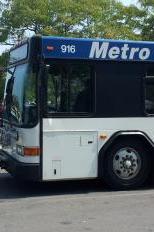






 Common Council members aren’t the only ones taking a stand against Mayor Paul Soglin’s proposed bus fare hikes. Fitchburg Alder Steve Arnold took the stand with a slew of Metro users to oppose the proposal at a public hearing in front of the Madison Transit and Parking Commission on Wednesday, Nov. 7.
Common Council members aren’t the only ones taking a stand against Mayor Paul Soglin’s proposed bus fare hikes. Fitchburg Alder Steve Arnold took the stand with a slew of Metro users to oppose the proposal at a public hearing in front of the Madison Transit and Parking Commission on Wednesday, Nov. 7.
The fare changes are a reaction to an across-the-board 5 percent budget cut to all city departments. At the hearing most of the speakers asked city officials to find another solution. The Common Council begins deliberations on the city budget Tuesday, Nov. 13 and will continue through Thursday, Nov. 15, if necessary.
Fitchburg Alder Steve Arnold said the late timing of the hike proposals would leave Metro’s service partners, like the city of Fitchberg, scrambling to react with their own budgets and infrastructure. Service partners pay a proportional cost of running the Metro system for routes in their region, subtracting the fee revenue for those routes.
“A fare change in Madison’s budget affects all other partners,” Arnold said. “I urge fares to be set in a collaborative manner that takes into account the policy goals of each of the partners; not just Madison’s.”
Arnold said city officials should have consulted service partners about the proposed changes before many partners set their budgets in fall. He said service changes proposed in November could take until July or later to implement.
Metro users had a stack of complaints to pile on top of Arnold’s. Twelve people registered against the proposed fare changes while two supported it. The commission ended the meeting without sending a recommendation to City Council.
“These rates are an attack on people who have to rely on this system, and the reason is you guys think we’re not going to put up a fight,” David Frazer said.
Several speakers noted that the proposed increases to passes for seniors and disabled riders were disporportionatly large compared to regular adult passes. The proposal hikes the adult 31-day pass by 13 percent, while increasing the senior/disabled pass by 45 percent and the low-income pass by 16 percent. See the chart below for a partial list of proposed rate changes.
“Before you think about raising the rates, think about the people who ride the bus,” Susan Wahl, a disabled veteran, said. “A lot of us don’t have the money for higher rates, and it gets a little stressful when you have to sit there and go, 'how am I gonna do it? As it stands right now … I have to dive into my laundry money so I can get to my doctor’s appointment tomorrow.'”
Linda Ketcham, executive director of Madison area Urban Ministry, said the increase in cost for low-income bus passes would reduce the number her organization could afford to give out to those in need—at a time when those lines are growing.
“We’re seeing an increase in the number of people using food pantries; we’re seeing an increasing homelessness rate,” Ketcham said. “The time is not right for this fare increase, and we ask you to reconsider these fare increases.”
Others echoed these concerns, saying people rely on the bus to find and keep jobs.
“This is my only way to get to work,” Ron Schutz said. “[The proposal] is putting stress on my ability to get to work.”
Speakers urged the city to look for other ways to save the money.
“I’m a poor man but I’ve always put efforts forth in things I believe are worthwhile,” Damon Terrell said. “We have the resources to figure this out; we just have to be creative enough to figure it out. I believe in you, and I hope you find some way to do this without breaking people’s hearts.”
|
|
|
Welcome to the Madison Commons, a website designed to provide news and information about all of Madison's neighborhoods and a crossroads for the discussion of community issues. The name comes from the idea of a village commons, a place for news, talk, debate, and some entertainment, too, that's open to everyone.
All rights reserved. Read more about the Madison Commons and its partners.

